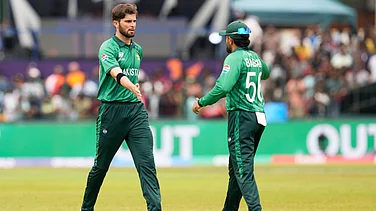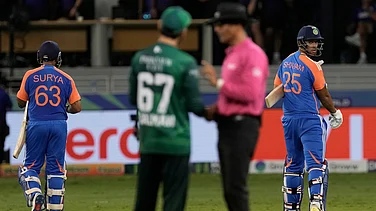THE Indians, having cut a sorry figure in the inaugural World Cup, did not do well in the next edition either, losing all their three matches. However, there was one individual performance which stood out like an oasis: Gundappa Vishwanath's majestic 75 against the defending champions West Indies at Edgbaston on June 9, 1979.
While essaying that knock against the four-pronged pace attack of Andy Roberts, Michael Holding, Colin Croft and Joel Garner, the master craftsman more than made up for Sunil Gavaskar's infamous 36 in 60 overs in the first World Cup and also demonstrated that Indian batsmen could play one-day cricket quite competently. Of course, considering the dominance of the Calypso charmers in world cricket in those years, the Indians were written off even before the first ball was bowled. But Vishwanath soured their victory a bit by playing what was unanimously described as one of the best ten innings of World Cup II. Michael Brearley, Clive Lloyd, Vivian Richards and many other discerning critics thought it was the finest innings played against the West Indies.
Aware of our batsmen's traditional weakness against brutal pace, Lloyd invited India to bat first after winning the toss. His decision was justi-fied by Roberts who drew first blood by removing Gavaskar. India's batting depended heavily on Gavaskar and Vishwanath, and it appeared as if the West Indies had won half the battle. At lunch India was precariously placed at 121 for 7 in 33 overs. Vishwanath, who arrived at the crease with the total reading 24 for 2, was on 45. He had batted brilliantly, reminding many of his famous 97 out of India's total of 190 against the same opponents in the '74-75 Chennai Test.
His batting provided the only interest in the Indian innings in the post-lunch session, and he continued from where he'd left off. But this time he was more innovative, too. While he had not spared any bowler, Croft was singled out for special treatment. As the fearsome foursome (and Collis King) tore into the Indian batting line-up—Gavaskar 8, Gaekwad 11, Vengsarkar 7, Brijesh Patel (run out) 15, Amarnath 8, Kapil Dev 12, Surinder Khanna 0—Vishwanath exhibited ideal footwork, technique and temperament in the art of playing high quality pace bowling, looking a picture of an artist engrossed in his masterpiece.
While he gave the impression of self-confidence personified, Vish-wanath did not miss any scoring opportunity. So perfect was his timing and placing that he was making runs almost at will with his wide range of strokes. So much so, he could late-cut a swinging yorker from Holding. He added 36 with Karsan Ghavri for the 8th wicket and lent some respectability to the total. Unfortunately, just when he was heading towards what would have been a marvellous century, he was out to a beauty from Holding. He was 9th out after scoring a priceless 75 (159 minutes, 136 balls, 7 fours). Quite surprisingly, Indian captain S. Venkataraghavan and Bishen Singh Bedi put on 27 runs for the last wicket before the innings folded up at 190 in 53.1 overs. Holding finished with figu-res of 4 for 33 in 12 lovely overs and Roberts 2 for 32 in 9.1. After Vishwanath's 75, the highest scorer was Mr Extras with 16. While Roberts was "greatly impressed", it was befitting that Vishwanath's 75 was the first truly great innings in a World Cup match by an Indian."That particular innings enjoys a special page in my diary," said Vishwanath.
Taking into account the big guns adorning the West Indian batting line-up, it was no surprise that they made 194 for 1 in 51.3 overs with Greenidge unconquered on 106 and Richards on 28. Haynes was out to Kapil Dev for 47. Dazzled, perhaps, by Greenidge's statistical feat, the adjudicator Jim Parks bestowed the Man of the Match on him. Though he played his innings without any pressure, and against an attack that was anything but dangerous, his stroke-play was no less dazzling than Vishwanath's. But for many, Vishy's chanceless innings was undoubtedly the high point for India in that World Cup.
Three-day Grief
INDIA suffered a humiliating defeat at the hands of Sri Lanka in the '79 World Cup in England. Sri Lanka was not yet a full member of the ICC, while India had been playing Tests since 1932. It was one of the biggest upsets in the history of cricket. The defeat left India the only team along with lowly-rated Canada without any points. After the match, the Indian dressing-room door was locked against sympathetic visitors. So profound was the team's grief at this particular loss.
Interestingly, the match was played over three days—the longest in one-day cricket history—according to statistician Tushar Trivedi. There was a delayed start on June 16, a Saturday. Next day became a 'rest' day, as no play used to take place on Sunday in England those days. Ultimately, the match was over on June 18. So it was a bizarre match in many ways.























